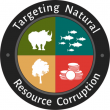TNRC places anti-corruption strategies on global conservation agendas
In the last six years, TRAFFIC has made significant progress in combatting widespread corruption in the illegal trade of wild species through its involvement in the Targeting Natural Resource Corruption Project (TNRC).

Corruption poses a major challenge to safeguarding wild species, as bribery, fraud, and collusion are some of the issues that undermine law enforcement efforts and enable illegal trade. This illicit trade threatens biodiversity and ecosystems, diverts economic benefits away from local communities, and funds other criminal activities.
In our efforts to find solutions, we proudly partnered with the TNRC project alongside the World Wildlife Fund (WWF), the U4 Anti-Corruption Resource Centre, and the Terrorism, Transnational Crime and Corruption Centre (TraCCC). TNRC, a USAID-funded initiative, is dedicated to boosting biodiversity. It aims to empower those working on conservation issues with the knowledge to address corruption threats to wildlife, fisheries, and forests.
As TRAFFIC’s six-year partnership with the Targeting Natural Resource Corruption project comes to a close, we reflect on its impact on both our work and that of our partners. Thanks to the project, we have:
- Doubled the number of publications discussing corruption risks and mitigation tools, covering analyses of corruption risks, applying behavioural change insights within countercorruption, researching tools to tackle permit fraud, and measuring the impact of a timber traceability tool in Tanzania.
- Established a permanent Anti-Corruption Coordinator position within TRAFFIC, responsible for integrating countercorruption into our activities.
- Built stronger partnerships with premier rule-of-law organisations like Transparency International and the Basel Institute on Governance.
- Helped set up and run the Practitioners Forum, the first-ever best-practice platform on environmental corruption, which now has 600 members.
- Conducted almost two dozen webinars and in-person trainings, producing two e-learning courses attended by over 500 participants from six continents. You can find the TNRC ‘Introduction to Corruption, Anti-corruption and Natural Resource Management” e-learning course in our Learning Centre.
- Actively showcased the critical links between conservation and anti-corruption work at the International Anti-Corruption Conference in Washington, DC, in 2022, marking TRAFFIC's biggest-ever representation.
- Trained over half our staff on countercorruption skills and project ideas.
Even as our partnership with TNRC ends, its impact will continue within TRAFFIC. With the insights gained from the project, TRAFFIC has drafted a Countercorruption strategy for the first time, highlighting our dedication to addressing corruption risks in the illegal wild species trade.
This strategy offers a blueprint for the accountability and transparency work that we plan to implement in the upcoming years. By sharing more information about their actions, decisions and policies, both the governmental and private sectors could help minimise the opacity that so often benefits corrupt actors.”
Gabriel Sipos, TRAFFIC’s Anti-Corruption Coordinator and TNRC project managerAdditionally, having more data allows us to make informed decisions on where to focus our efforts to combat illegal wildlife trade, he added. TRAFFIC will continue to support its partners by analysing corruption's adverse impact on biodiversity and mapping effective counter-corruption solutions for the trade of wild species.
Recent publications
 |  |  |
About Targeting Natural Resource Corruption (TNRC)

The Targeting Natural Resource Corruption (TNRC) project is working to improve biodiversity outcomes by helping practitioners to address the threats posed by corruption to wildlife, fisheries and forests. TNRC harnesses existing knowledge, generates new evidence, and supports innovative policy and practice for more effective anti-corruption programming. Learn more at tnrcproject.org.
About USAID

The United States Agency for International Development (USAID) is responsible for the majority of overseas development assistance from the United States Government and works to end extreme poverty and promote resilient, democratic societies while advancing security and prosperity for America and the world. www.usaid.gov/





